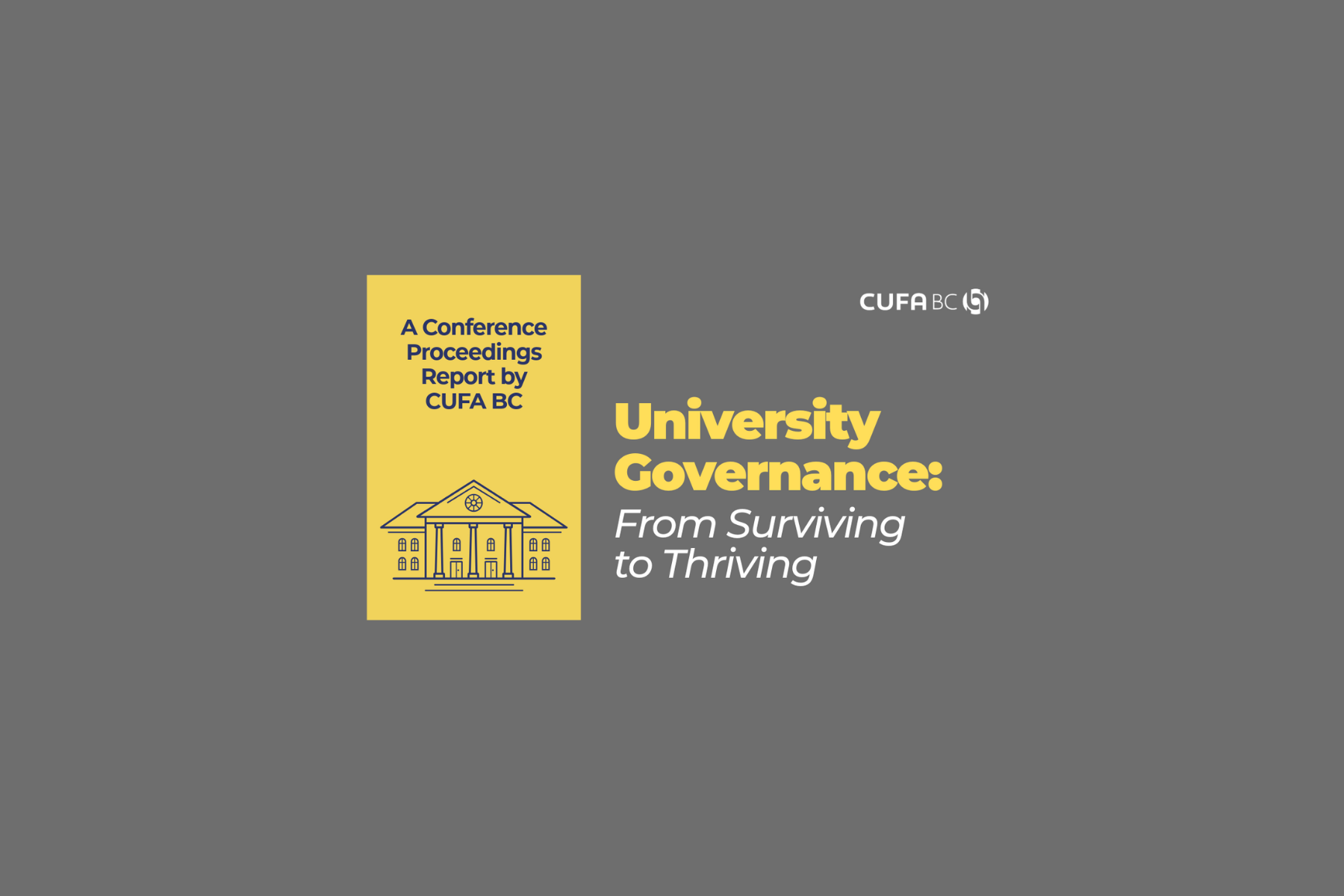
Diverse Perspectives & Expert Insights from CUFA BC’s University Governance Conference
May 22, 2025
CUFA BC has published a new report, University Governance: From Surviving to Thriving (PDF), which synthesizes key insights and compelling discussions from our national university governance conference held last year.
The report provides a critical assessment of university governance in the wake of the COVID-19 pandemic, which saw many norms bypassed with lasting effects. It explores the increasing neoliberalization of post-secondary education in Canada, driven by pressures such as underfunding and overregulation. Further, the report dives into the internal tensions, dysfunctions, and power imbalances within university governance systems—highlighting possible root causes and suggesting sustainable solutions.
This is a practical and inspiring publication for anyone working to strengthen governance at Canadian universities. Beyond simply documenting the conference proceedings, this report distills the speakers’ most compelling discussions, insights, success stories, and advice into an actionable resource. Above all, it’s a call to refocus on core values: transparency, collegiality, and academic integrity.
University Governance: From Surviving to Thriving (PDF) is publicly available and free to download. Message us to get your own paper copy!
Excerpts From the Report
‘Pandemic Perspectives: What Happened?’, page 15 of University Governance: From Surviving to Thriving.
“The pandemic disrupted collegial governance, with people often citing ‘exceptional circumstances’ as a reason not to do things by the book. But in many cases the impacts have been lasting,” said Jacqueline Holler, Professor at UNBC. She cited a “cautionary tale” about the University of Alberta General Faculties’ Council’s executive decision to introduce a credit or no credit grading system for the Winter 2020 semester. The decision wasn’t submitted for discussion to the General Faculties’s Council because of perceived urgency—so when the council finally met, faculty were deeply divided, with many seeing the decision as a done deal.
Mark Mac Lean, Professor at UBC, examined the government’s Return-to-Campus guidelines as an example of boards allowing external interference. “It evolved from the Public Health Officer giving orders to the Ministry making decisions about how classes should operate. This was an overstepping … and there was a tendency for the board to just accept this. But there should have been more discussion. The senate should have been better consulted, and the board had a responsibility to ensure that.” Mac Lean emphasized that there was no legal argument to support boards “rubber-stamping” the guidelines. Quite the opposite, he argues—boards should pay special attention to their statutory responsibilities during extraordinary events and circumstances.
Post-pandemic, “we’re seeing more and more proposals from senior administrators to eliminate meaningful faculty involvement,” said Larry Savage, Professor & Senate Vice-Chair at BrockU. However, he was careful to consider the external pressures behind this trend. “While it’s true that administrations may take particular approaches to budgetary constraints, restructuring, or labour relations, they’re all responding to broader political trends that are changing the nature of the university as an institution.”
“I don’t believe the governance model is at threat, or that we necessarily have a governance crisis … I do think we have a leadership problem in higher education,” said Jeff Hennessey, President & Vice Chancellor at AcadiaU. “We need a better informed community about how governance works and we need better leaders who respect and champion the governance model.” He added that “one way we might improve that is to have more experiences like this [conference], where administrators and faculty association representatives can discuss matters away from their own local environments.”
Robin Whitaker, Vice-President at CAUT, cautioned against embracing a crisis narrative, “not because the problems we’re facing aren’t real—they certainly are—but because that analytical frame may direct our attention from questions that we need to ask.” She encouraged us to consider the effects of “mundane and routine factors” that contribute to things going wrong, such as strained relations between the senate and board.
Whitaker acknowledged that it’s easy to feel hopeless in the face of the issues impacting university governance. However, she warned that a “politics of resignation” is “a conservative force in a bad way—that may serve some, but it doesn’t work in the best interests of the public university.”
Download the full report (PDF).
About the conference
Held in Vancouver, BC, on January 18-19, 2024, our university governance conference convened over 100 faculty, administrators, union leaders, and policymakers from across Canada to explore pressing issues in university governance. It was the third conference of its kind—and definitely not the last!
ABSTRACT: University governance reached a turning point in the pandemic that exposed fundamental flaws in institutional decision-making. Administrations say the pre-pandemic rules and structures are outdated, and no longer serve the purposes they once did. Senates and faculty say they’re displaced from shared governance, their authority and autonomy in decision-making eroded. Faculty associations participate in university governance, but their role is historically peripheral and ambiguous. The overarching questions behind this conference are: What is the state of university governance today, and can it survive modern day challenges? Is there a defined role for faculty associations in the governance model of today’s university?
Featured speakers:
- Jaqueline Holler, Professor, University of Northern BC (UNBC)
- Julia Eastman, governance author, speaker, and advisor
- Mark Mac Lean, Professor, University of British Columbia (UBC)
- Rick Kool, Professor, Royal Roads University
- Glen Jones, Professor, University of Toronto
- Larry Savage, Professor & Senate Vice-Chair, Brock University
- Max Blouw, President, Research Universities’ Council of BC (RUCBC)
- James (Jim) Johnson, Professor, University of British Columbia Okanagan (UBC-O)
- Sarika Bose, Lecturer, UBC
- Kumari Beck, Associate Professor, Simon Fraser University (SFU) & President, SFU Faculty Association (SFUFA)
- Rheanna Robinson, Associate Professor, UNBC
- Cheryl Foy, President, Strategic Governance Consulting Services
- Jeff Hennessy, President & Vice Chancellor, Acadia University
- Robin Whitaker, Vice-President, Canadian Association of University Teachers (CAUT)
- Marc Spooner, Professor, University of Regina
- Shannon Dea, Dean, Faculty of Arts, University of Regina
- Sue Wurtele, Associate Professor, Trent University & Past President, Ontario Confederation of University Faculty Associations (OCUFA)
